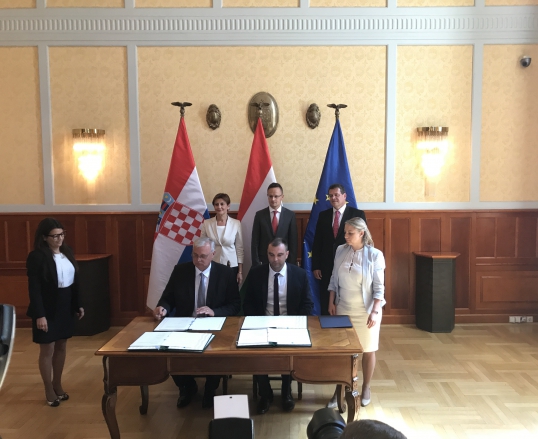Croatia, Hungary Sign MoU To Boost Gas Flows
Croatia and Hungary signed a memo of understanding (MoU) June 20 to facilitate two-way flows of gas at all their interconnection points with EU states.
The agreement comes at a time when gas experts in the region have pointed to high Croatian gas export tariffs as a block on investment in key regional assets, such as a floating LNG import terminal on Krk island in Croatia meant to serve not only that country but its central European neighbours.
Signing of the MoU in the Hungarian capital Budapest was announced by Croatian gas transmission system operator (TSO) Plinacro. It was signed by Croatia's state secretary for environmental protection and energy Mario Silje, his counterpart at the Hungarian ministry of national development Andras Aradszki, representatives of the Croatian and Hungarian energy regulators Hera and MEKH, and Plinacro and its Hungarian gas counterpart FGSZ.
The signing was witnessed by European Commission vice-president for energy union, Maros Sefcovic (below standing on right, in front of EU flag).

Signing of the Budapest memorandum on June 20 (Photo credit: Plinacro)
Plinacro said that the MoU aims, in three phases, to put into practice two-way capacities at all interconnection points with EU member states. In the first phase, short-term measures will allow for interruptible physical return using the Hungarian compressor station. In the second phase by end-March 2019, the first compressor station will be constructed in Croatia. In the third and final stage, additional capacity infrastructure will be built up under the condition of providing new gas sources, such as the construction of an LNG terminal on Krk, or the Ionian Adriatic pipeline (the latter a spur line from the TAP pipe).
Experts have repeatedly said that, with currently very high Croatian gas export transmission tariffs, it is uneconomic to flow gas from Croatia to Hungary, making investment in the EU co-funded but now delayed LNG Croatia project at Krk unviable unless there are changes to such tariffs.
The Plinacro statement did not say what impact the new MoU will have on tariffs, or on the estimated €363mn Krk project. The latter is still yet to take a final investment decision, despite remarks from LNG Croatia's former managing director last summer that FID was due in second half 2016.
LNG Croatia's new managing director Goran Francic was quoted by local news agency, Total Croatia News, last month saying that a tender for the required floating storage and regasification unit would be issued this summer to shipowners. His predecessor had expected that to happen in 2H 2016.
Plinacro said the MoU was signed in the context of the central and southeastern Europe Initiative (Cesec) on interconnection of regional gas systems. The initiative is one of the measures put in place in recent years in order to limit the ability of Gazprom to dominate markets in its former satellite states, whose pipelines reflect the trading patterns of the monopolistic era.
Mark Smedley



